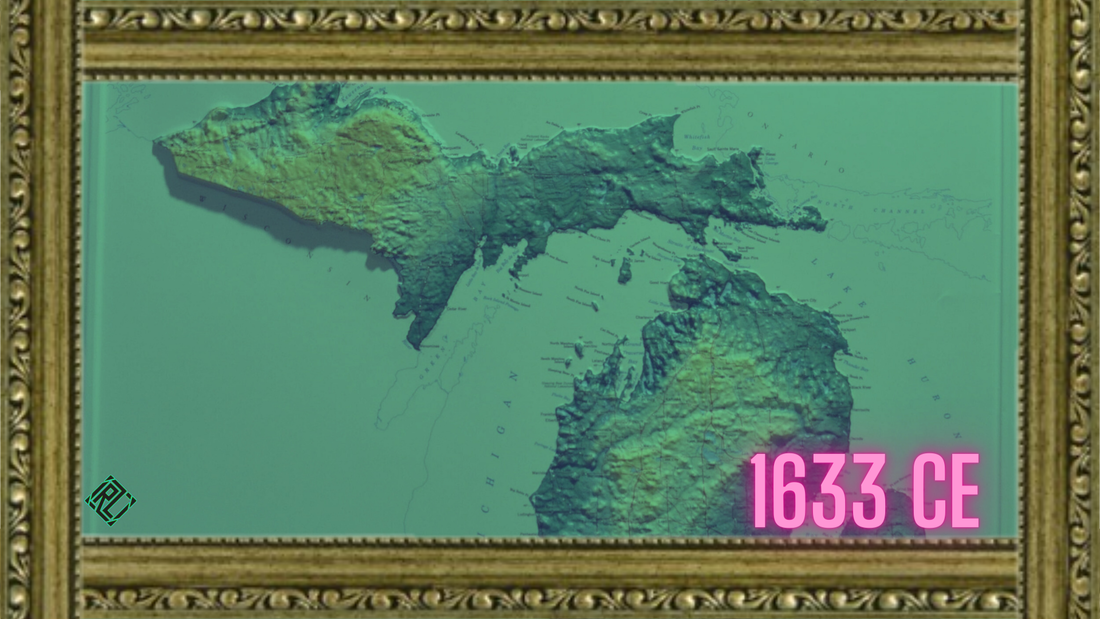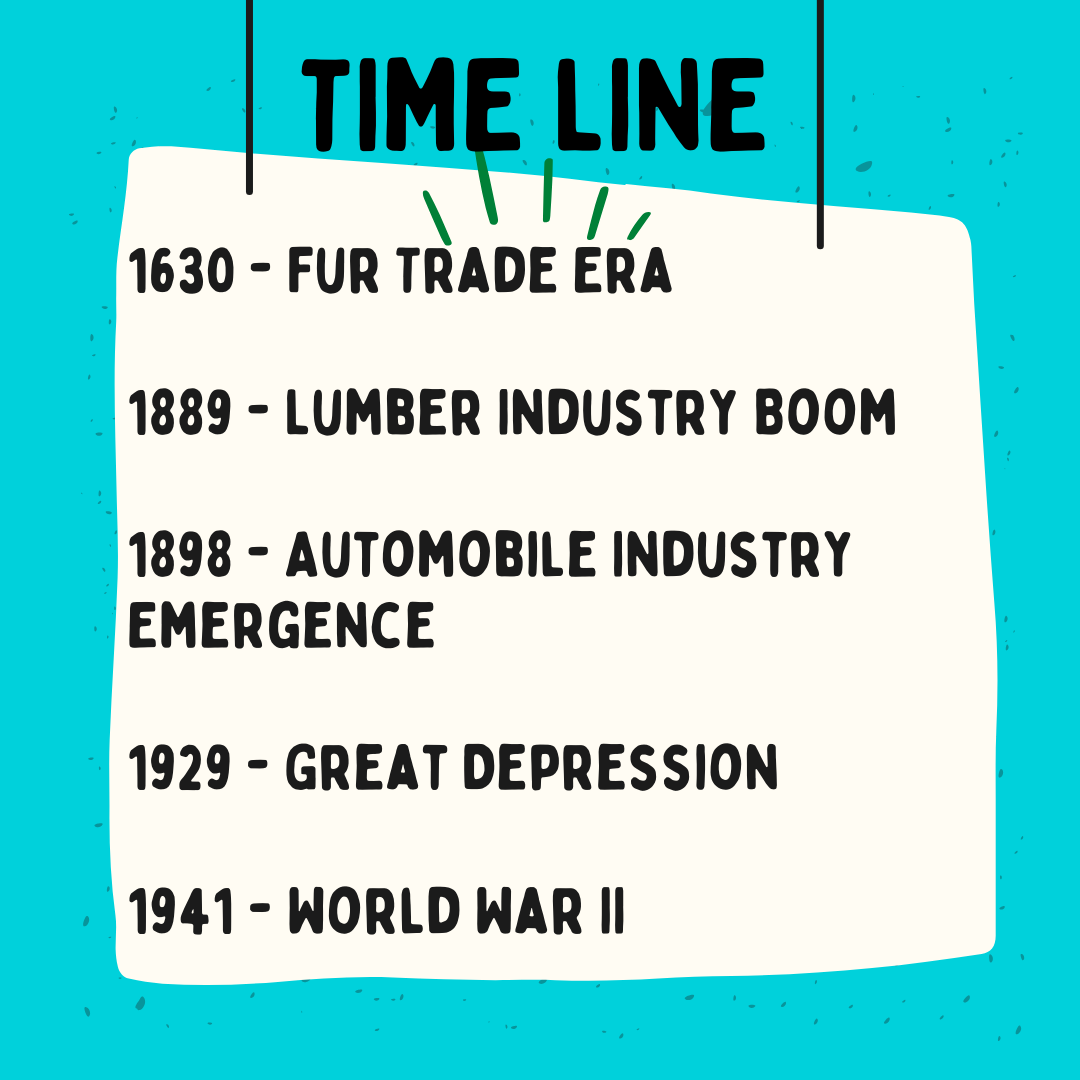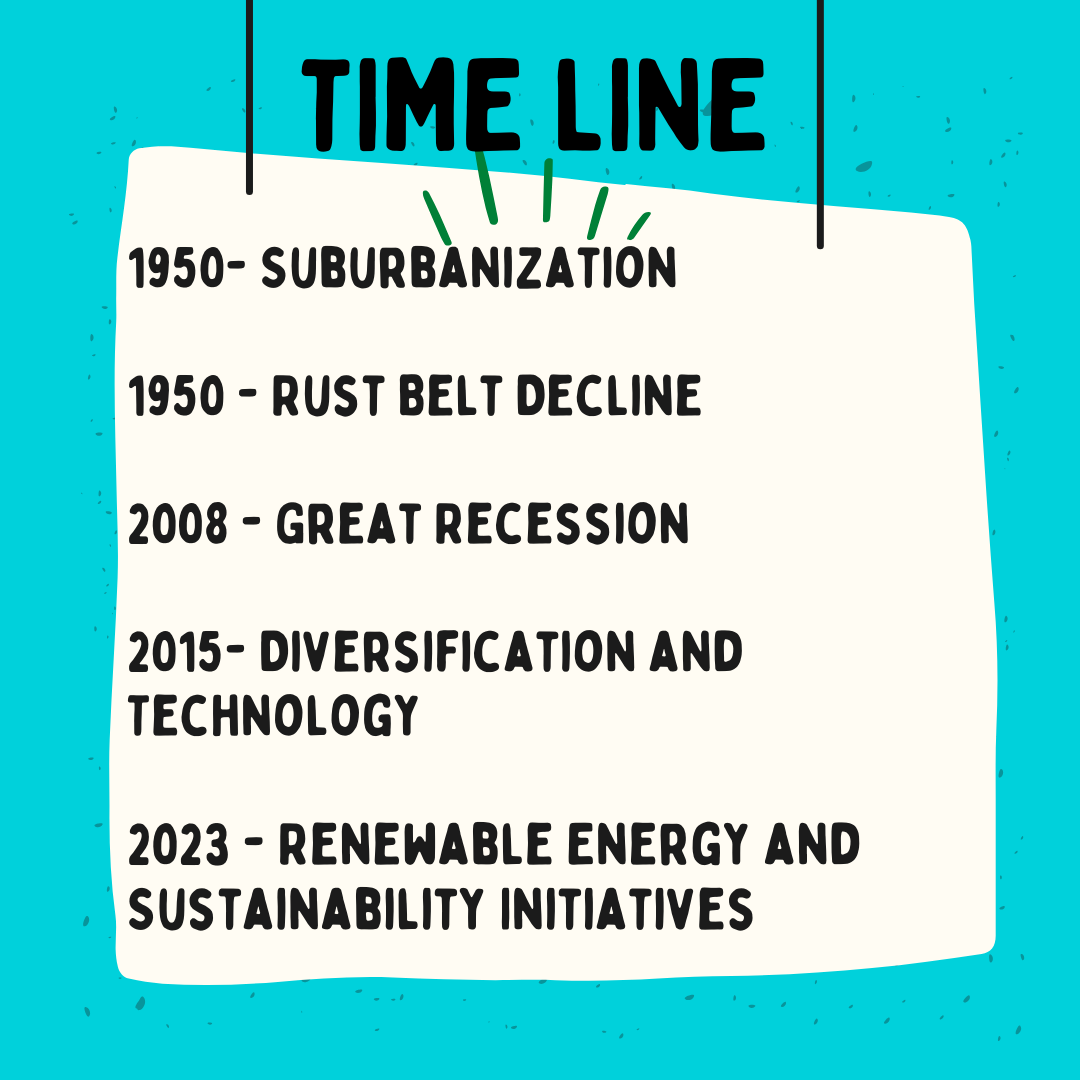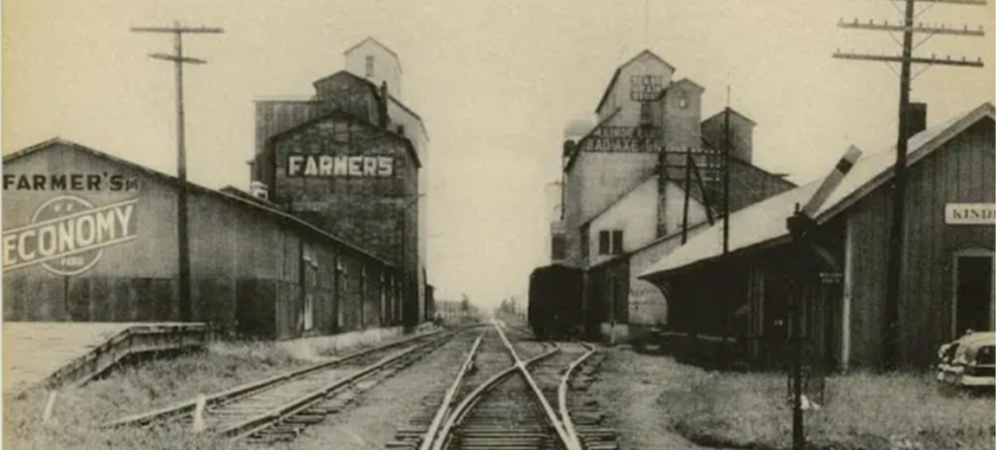Module Twelve: Great Lakes & Great Profits
Michigan is where economic fates sway like the latest dance craze on social media. Imagine a place shaped not only by factories and hard work but also by the gritty resolve of people who've faced more challenges than a weather forecaster after a wild night out. Let's dive into the heyday of automobiles when Michigan was hotter than a chili pepper in a sauna. Henry Ford burst onto the scene like a rockstar, churning cars faster than you can say "production line." Suddenly, everyone and their neighbor had a Ford in the driveway, and Michigan was living the American Dream faster than you can say "flashy parties."
Then along came World War II, the ultimate plot twist in Michigan's story. The state switched gears from making cars to making tanks quicker than you can say "Rosie the Riveter." Talk about a wartime transformation! Michigan became the star player of the industrial scene, flexing its muscles with more steel than a superhero's secret hideout. But hold onto your hats because here comes the Rust Belt decline, hitting harder than a Monday morning alarm. Suddenly, those production lines were gathering dust faster than your grandma's collection of knickknacks. Detroit went from a bustling metropolis to a ghost town quicker than you can say "economic downturn."
Let's not forget the 2008 Great Recession, when Michigan found itself at the epicenter of a financial whirlwind. The significant automakers were on life support faster than you can say "government bailout," the state was left staggering like a boxer after a knockout blow. It's not all bad news in the Wolverine State. Michigan's economic journey resembles a rollercoaster ride with more twists and turns than a celebrity romance. It's a reminder that life isn't always smooth sailing; sometimes, you must weather the storm to see the rainbow.
So, what's the lesson from Michigan's economic rollercoaster? Well, as they say, what doesn't break you strengthens you. Michigan might have taken a beating, but it's still standing tall, ready to face whatever economic challenges. Ultimately, Michigan's economic history isn't just a tale—it's a testament to human resilience. It's a reminder that no matter how tough things get, there's always a silver lining waiting to be discovered.
THE RUNDOWN
QUESTIONS
Then along came World War II, the ultimate plot twist in Michigan's story. The state switched gears from making cars to making tanks quicker than you can say "Rosie the Riveter." Talk about a wartime transformation! Michigan became the star player of the industrial scene, flexing its muscles with more steel than a superhero's secret hideout. But hold onto your hats because here comes the Rust Belt decline, hitting harder than a Monday morning alarm. Suddenly, those production lines were gathering dust faster than your grandma's collection of knickknacks. Detroit went from a bustling metropolis to a ghost town quicker than you can say "economic downturn."
Let's not forget the 2008 Great Recession, when Michigan found itself at the epicenter of a financial whirlwind. The significant automakers were on life support faster than you can say "government bailout," the state was left staggering like a boxer after a knockout blow. It's not all bad news in the Wolverine State. Michigan's economic journey resembles a rollercoaster ride with more twists and turns than a celebrity romance. It's a reminder that life isn't always smooth sailing; sometimes, you must weather the storm to see the rainbow.
So, what's the lesson from Michigan's economic rollercoaster? Well, as they say, what doesn't break you strengthens you. Michigan might have taken a beating, but it's still standing tall, ready to face whatever economic challenges. Ultimately, Michigan's economic history isn't just a tale—it's a testament to human resilience. It's a reminder that no matter how tough things get, there's always a silver lining waiting to be discovered.
THE RUNDOWN
- Automobile Industry Boom: Michigan's economy flourished with the rise of car manufacturing, creating jobs and improving lives.
- World War II Contributions: During the war, Michigan played a big role in making things for the military, which helped the state's economy grow.
- Rust Belt Decline: When factories closed, Michigan's economy suffered, especially in cities like Detroit.
- Great Recession Challenges: In 2008, Michigan faced money problems, especially with car companies needing help to survive.
- Lessons for Diversification: Michigan learned it's important to have different types of jobs to stay strong economically.
- Community Resilience: The Detroit Renaissance shows how people working together can improve a place, even during tough times.
QUESTIONS
- What were the biggest moments in Michigan's economic history? How did they change the state's economy, and what can we learn from them?
- Globalization's Impact: How has the world becoming more connected affected Michigan's economy? What good and bad things have come from it, and what can Michigan do to deal with the challenges?
- Staying Strong: Michigan has learned it needs different types of jobs to keep its economy going strong. How can the state make sure it stays strong even when things get tough? What jobs do you think will be important in the future?
#12 Perception is Reality
The enigmatic dance of perception, weaving its intricate tapestry between truth and deception, reality and fantasy. Buckle up, folks, for a rollercoaster journey through the labyrinth of history's funhouse mirrors, where reality wears a mask, and the truth plays hide-and-seek like a mischievous imp.
Let's kick off with a bang, shall we? The Gulf of Tonkin incident is a classic tale of international he-said-she-said. Picture it: 1964, tension fills the air, and suddenly, reports emerge of North Vietnamese attacks on American ships. Cue the suspenseful music, enter stage right, the Gulf of Tonkin Resolution, handing LBJ the keys to ramp up the Vietnam War faster than you can say, "Hold up, what just happened?" But pause for a moment because after looking it over, those attacks might've been as accurate as a unicorn sighting in Times Square. Perception, my friends, can be as elusive as a politician's sincerity, especially when wrapped in layers of political agenda.
Now, let's shift gears and bask in the glow of the Civil Rights Movement, where perception served not as a tool of manipulation but as a beacon of hope in a sea of injustice. Picture MLK Jr. striding onto the scene, armed with nothing but a dream and impeccable fashion sense, ready to tackle segregation like a pro. It wasn't merely about bus seating arrangements but about flipping the script on centuries of systemic oppression. And guess what? The perception took center stage, transforming collective outrage into legislative victories that rattled the foundations of discrimination. Talk about making lemonade out of lemons.
But the Iraq War is a tale of caution if there ever was one. Remember those WMDs? Weapons of Mass Distraction, more like. Bush and his crew sold us a shiny package that closed our eyes to the truth lurking in the shadows. Turns out, those smoking guns were nothing but smoke and mirrors, leaving behind a wake of devastation even Houdini couldn't escape. Perception, my friends, cuts through reality like a sharp blade with all the finesse of a blindfolded samurai.
And let's not overlook the #MeToo Movement, where perception became the battle cry for the silenced and oppressed. From Hollywood to Main Street, survivors rose, shouting their truths from the rooftops and bringing down industry giants like a human Jenga game. Suddenly, what was once whispered behind closed doors became a rallying cry for change, shaking the very pillars of the status quo. Perception, my friends, can spark a revolution, igniting the fuse on long-overdue reckonings.
But why stop there? Let's dive into the Cuban Missile Crisis, shall we? Two superpowers, locked in a high-stakes game of brinkmanship, each convinced the other was a hair trigger away from pushing the big red button. It was a showdown of epic proportions, a clash of egos and ideologies that held the world in suspense. Yet, amid the bluster and bravado, something miraculous emerged: diplomacy. Kennedy and Khrushchev, two men with the world's fate in their hands, saw through the smoke and mirrors to find common ground. Perception, my friends, can be a pathway to peace if only we're willing to take that leap of faith.
So, what's the takeaway for you? For better or worse, perception molds our reality in ways beyond comprehension. It's a slippery slope, a two-faced coin, a wildcard in life's deck. That's what makes it so darn intriguing.
RUNDOWN
STATE OF THE STATE
Let's kick off with a bang, shall we? The Gulf of Tonkin incident is a classic tale of international he-said-she-said. Picture it: 1964, tension fills the air, and suddenly, reports emerge of North Vietnamese attacks on American ships. Cue the suspenseful music, enter stage right, the Gulf of Tonkin Resolution, handing LBJ the keys to ramp up the Vietnam War faster than you can say, "Hold up, what just happened?" But pause for a moment because after looking it over, those attacks might've been as accurate as a unicorn sighting in Times Square. Perception, my friends, can be as elusive as a politician's sincerity, especially when wrapped in layers of political agenda.
Now, let's shift gears and bask in the glow of the Civil Rights Movement, where perception served not as a tool of manipulation but as a beacon of hope in a sea of injustice. Picture MLK Jr. striding onto the scene, armed with nothing but a dream and impeccable fashion sense, ready to tackle segregation like a pro. It wasn't merely about bus seating arrangements but about flipping the script on centuries of systemic oppression. And guess what? The perception took center stage, transforming collective outrage into legislative victories that rattled the foundations of discrimination. Talk about making lemonade out of lemons.
But the Iraq War is a tale of caution if there ever was one. Remember those WMDs? Weapons of Mass Distraction, more like. Bush and his crew sold us a shiny package that closed our eyes to the truth lurking in the shadows. Turns out, those smoking guns were nothing but smoke and mirrors, leaving behind a wake of devastation even Houdini couldn't escape. Perception, my friends, cuts through reality like a sharp blade with all the finesse of a blindfolded samurai.
And let's not overlook the #MeToo Movement, where perception became the battle cry for the silenced and oppressed. From Hollywood to Main Street, survivors rose, shouting their truths from the rooftops and bringing down industry giants like a human Jenga game. Suddenly, what was once whispered behind closed doors became a rallying cry for change, shaking the very pillars of the status quo. Perception, my friends, can spark a revolution, igniting the fuse on long-overdue reckonings.
But why stop there? Let's dive into the Cuban Missile Crisis, shall we? Two superpowers, locked in a high-stakes game of brinkmanship, each convinced the other was a hair trigger away from pushing the big red button. It was a showdown of epic proportions, a clash of egos and ideologies that held the world in suspense. Yet, amid the bluster and bravado, something miraculous emerged: diplomacy. Kennedy and Khrushchev, two men with the world's fate in their hands, saw through the smoke and mirrors to find common ground. Perception, my friends, can be a pathway to peace if only we're willing to take that leap of faith.
So, what's the takeaway for you? For better or worse, perception molds our reality in ways beyond comprehension. It's a slippery slope, a two-faced coin, a wildcard in life's deck. That's what makes it so darn intriguing.
RUNDOWN
- The Gulf of Tonkin incident during the Vietnam War shows how false stories can lead to big decisions.
- The Civil Rights Movement in the 1960s proves that when people see unfairness, they can make changes together.
- The Iraq War teaches us the danger of believing wrong information, like about weapons that weren't there.
- The #MeToo Movement, starting in 2017, helped people speak out about sexual harassment, making a difference.
- Winners often control how we see history, so it's important to think about different viewpoints.
- Learning about perception in history helps us understand truth from lies, especially in today's world of lots of information.
STATE OF THE STATE
HIGHLIGHTS
We've got some fine classroom lectures coming your way, all courtesy of the RPTM podcast. These lectures will take you on a wild ride through history, exploring everything from ancient civilizations and epic battles to scientific breakthroughs and artistic revolutions. The podcast will guide you through each lecture with its no-nonsense, straight-talking style, using various sources to give you the lowdown on each topic. You won't find any fancy-pants jargon or convoluted theories here, just plain and straightforward explanations anyone can understand. So sit back and prepare to soak up some knowledge.
LECTURES
LECTURES
- UNDER CONSTRUCTION!
READING
This class utilizes the following textbook:
Hathaway, Richard J. Michigan Visions of Our Past. United States Of America: Michigan State University Press, 1989.
"Michigan: Visions of Our Past" is an exhilarating adventure through the state's eventful history, led by scholars like Hathaway wielding the tools of the past. This collection reads like a diverse assortment of exciting stories and surprising revelations, providing a non-linear exploration of Michigan's struggle with its identity – be it navigating labor disputes, economic ups and downs, or the enduring conflict between religion and education. The book, resembling more of a mind-bending trip than a traditional history lesson, reflects Michigan's tumultuous history, encouraging readers to recognize that history is not merely a forgotten tome but a guidebook for the state's uncertain future. In this unconventional narrative, Michigan's history unfolds as a disorderly, absurd spectacle – a turbulent, unpredictable journey that embraces idiosyncrasies, confronts challenges, and invites everyone to the lively celebration of the past.
- Hathaway Chapter Seven: Modernizing Michigan: Political and Social Trends, 1836-1866"
This class utilizes the following textbook:
Hathaway, Richard J. Michigan Visions of Our Past. United States Of America: Michigan State University Press, 1989.
"Michigan: Visions of Our Past" is an exhilarating adventure through the state's eventful history, led by scholars like Hathaway wielding the tools of the past. This collection reads like a diverse assortment of exciting stories and surprising revelations, providing a non-linear exploration of Michigan's struggle with its identity – be it navigating labor disputes, economic ups and downs, or the enduring conflict between religion and education. The book, resembling more of a mind-bending trip than a traditional history lesson, reflects Michigan's tumultuous history, encouraging readers to recognize that history is not merely a forgotten tome but a guidebook for the state's uncertain future. In this unconventional narrative, Michigan's history unfolds as a disorderly, absurd spectacle – a turbulent, unpredictable journey that embraces idiosyncrasies, confronts challenges, and invites everyone to the lively celebration of the past.
Howard Zinn was a historian, writer, and political activist known for his critical analysis of American history. He is particularly well-known for his counter-narrative to traditional American history accounts and highlights marginalized groups' experiences and perspectives. Zinn's work is often associated with social history and is known for his Marxist and socialist views. Larry Schweikart is also a historian, but his work and perspective are often considered more conservative. Schweikart's work is often associated with military history, and he is known for his support of free-market economics and limited government. Overall, Zinn and Schweikart have different perspectives on various historical issues and events and may interpret historical events and phenomena differently. Occasionally, we will also look at Thaddeus Russell, a historian, author, and academic. Russell has written extensively on the history of social and cultural change, and his work focuses on how marginalized and oppressed groups have challenged and transformed mainstream culture. Russell is known for his unconventional and controversial ideas, and his work has been praised for its originality and provocative nature.
My classes utilize both Howard Zinn's A People's History of the United States and Larry Schweikart's Patriot's History of the United States, mostly in excerpts posted to the modules.
My classes utilize both Howard Zinn's A People's History of the United States and Larry Schweikart's Patriot's History of the United States, mostly in excerpts posted to the modules.

Zinn, A People's History of the United States
"... The forced service of seamen led to a riot against impressment in Boston in 1747. Then crowds turned against Thomas Hutchinson, a rich merchant and colonial official who had backed the governor in putting down the riot, and who also designed a currency plan for Massachusetts which seemed to discriminate against the poor. Hutchinson's house burned down, mysteriously, and a crowd gathered in the street, cursing Hutchinson and shouting, 'Let it burn!'
By the years of the Revolutionary crisis, the 1760s, the wealthy elite that controlled the British colonies on the American mainland had 150 years of experience, had learned certain things about how to rule. They had various fears, but also had developed tactics to deal with what they feared.
The Indians, they had found, were too unruly to keep as a labor force, and remained an obstacle to expansion. Black slaves were easier to control, and their profitability for southern plantations was bringing an enormous increase in the importation of slaves, who were becoming a majority in some colonies and constituted one-fifth of the entire colonial population. But the blacks were not totally submissive, and as their numbers grew, the prospect of slave rebellion grew..."
"... The forced service of seamen led to a riot against impressment in Boston in 1747. Then crowds turned against Thomas Hutchinson, a rich merchant and colonial official who had backed the governor in putting down the riot, and who also designed a currency plan for Massachusetts which seemed to discriminate against the poor. Hutchinson's house burned down, mysteriously, and a crowd gathered in the street, cursing Hutchinson and shouting, 'Let it burn!'
By the years of the Revolutionary crisis, the 1760s, the wealthy elite that controlled the British colonies on the American mainland had 150 years of experience, had learned certain things about how to rule. They had various fears, but also had developed tactics to deal with what they feared.
The Indians, they had found, were too unruly to keep as a labor force, and remained an obstacle to expansion. Black slaves were easier to control, and their profitability for southern plantations was bringing an enormous increase in the importation of slaves, who were becoming a majority in some colonies and constituted one-fifth of the entire colonial population. But the blacks were not totally submissive, and as their numbers grew, the prospect of slave rebellion grew..."

Larry Schweikart, A Patriot's History of the United States
"... Despite lower rates, opposition arose over the new enforcement mechanisms, including the referral of all smuggling cases to admiralty courts that had judges instead of juries, which normally handled such cases. Any colonial smuggler knew that the outcome of such a trial was less often in his favor, and complaints arose that the likelihood of real prosecution and conviction was higher under the new law. A second law, the Currency Act of 1764, prohibited the colonies from issuing paper money. When combined with the taxes of the Sugar Act, colonists anticipated that the Currency Act would drain the already scarce metallic money (specie, or gold and silver coins) from America, rendering merchants helpless to counteract inflation that always followed higher taxes.
By 1764, then, colonists drew a direct correlation between paying taxes and governing, and between government intervention in the economy and inflation. A few early taxes had existed on land, but land ownership conferred voting status. Other than that, only a handful of other direct taxes were levied, especially in light of the small size and limited power of government. 'The more revenue governments had, the more mischief they could create,' was the prevailing colonial view. In sharp contrast to land taxes, Grenville’s new duties were in no way associated with rights, and all subjects—landowners or otherwise—now had to pay..."
"... Despite lower rates, opposition arose over the new enforcement mechanisms, including the referral of all smuggling cases to admiralty courts that had judges instead of juries, which normally handled such cases. Any colonial smuggler knew that the outcome of such a trial was less often in his favor, and complaints arose that the likelihood of real prosecution and conviction was higher under the new law. A second law, the Currency Act of 1764, prohibited the colonies from issuing paper money. When combined with the taxes of the Sugar Act, colonists anticipated that the Currency Act would drain the already scarce metallic money (specie, or gold and silver coins) from America, rendering merchants helpless to counteract inflation that always followed higher taxes.
By 1764, then, colonists drew a direct correlation between paying taxes and governing, and between government intervention in the economy and inflation. A few early taxes had existed on land, but land ownership conferred voting status. Other than that, only a handful of other direct taxes were levied, especially in light of the small size and limited power of government. 'The more revenue governments had, the more mischief they could create,' was the prevailing colonial view. In sharp contrast to land taxes, Grenville’s new duties were in no way associated with rights, and all subjects—landowners or otherwise—now had to pay..."

Thaddeus Russell, A Renegade History of the United States
"... Two days after taking office, Roosevelt, invoking a “national emergency,” took an unprecedented step toward autocratic power. For the first time in United States history, a president closed the nation’s banks. Then, on March 9, Congress transferred much of its power to the president and gave him sole authority over a large swath of the nation’s economy. The Trading with the Enemy Act of 1917 was amended to declare that during time of war “or during any other period of national emergency declared by the President, the President may, through any agency that he may designate, or otherwise, investigate, regulate, or prohibit, under such rules and regulations as he may prescribe, by means of licenses or otherwise, any transactions in foreign exchange, transfers of credit between or payments by banking institutions as defined by the President, and exporting, hoarding, melting, or earmarking of gold or silver coin or bullion or currency.” Congress effectively gave the president unchecked control over banks and financial transactions in general, and everything concerning gold in particular. More ominously, the new law allowed the president to alone decide when to acquire and exercise that power..."
"... Two days after taking office, Roosevelt, invoking a “national emergency,” took an unprecedented step toward autocratic power. For the first time in United States history, a president closed the nation’s banks. Then, on March 9, Congress transferred much of its power to the president and gave him sole authority over a large swath of the nation’s economy. The Trading with the Enemy Act of 1917 was amended to declare that during time of war “or during any other period of national emergency declared by the President, the President may, through any agency that he may designate, or otherwise, investigate, regulate, or prohibit, under such rules and regulations as he may prescribe, by means of licenses or otherwise, any transactions in foreign exchange, transfers of credit between or payments by banking institutions as defined by the President, and exporting, hoarding, melting, or earmarking of gold or silver coin or bullion or currency.” Congress effectively gave the president unchecked control over banks and financial transactions in general, and everything concerning gold in particular. More ominously, the new law allowed the president to alone decide when to acquire and exercise that power..."
In the swirling chaos of time's tumult, where yesterday slams into today like a tipsy driver in rush hour traffic, we face the tangled mess of rebellion, oppression, and financial woes. Buckle up, folks, because we're about to embark on a rollercoaster ride through history, navigating colonial discontent and Michigan's economic rollercoaster with all the grace of a sailor on shore leave.
Let's start with a rebellion cocktail: Forced Seamen Service and Economic Grumblings. Picture this: American colonists plucked off their ships like ripe fruit by the rapacious, rum-fueled claws of the British navy. It's like highway robbery on the high seas, with extra scurvy and minus the charm. Families wonder if their loved ones will return or become shark bait from the waves.
But hold onto your hats because we're veering into the icy waters of Michigan's economic saga. Imagine a land ruled by fur, where trappers roam like modern-day knights chasing beaver pelts instead of damsels. Then, bam! The fur trade crashes like a lead balloon at a helium party. Economic woes spread like wildfire, leaving communities in disarray.
Now, let's plunge into the swamp of Discriminatory Economic Policies, where taxes rain down like dollar bills at a strip joint. The British, masters of fiscal torment, slap taxes on everything from sugar to paper faster than you can say "Boston Tea Party." It's taxation without representation, an economic probe without the lubricant.
Meanwhile, back in Michigan, the automotive industry went from king to pauper quicker than you can say, "Model T." The Great Depression hits like a Tyson punch, leaving workers jobless and factories empty.
But wait, there's more! Legal Shenanigans and Power Grabs, anyone? The British play fast and loose with legal rights, tossing writs of assistance like confetti at a royal wedding. It's a dystopian nightmare where freedoms vanish faster than a goldfish in a blender.
Meanwhile, industrialists rise like monarchs in Michigan, controlling everything from lumber to mining, with influence stretching farther than a Kardashian's social media reach.
So, what's the moral of this chaotic history lesson? Well, folks, it's simple: history's playlist has some serious repeats. The same old themes keep cropping up like a stubborn stain, whether it's colonial rebellion or Michigan's economic woes. So, next time you're grumbling about taxes or cursing the powers that be, remember: we're all passengers on this wild ride through history, armed only with a bottle of spirits and a wicked sense of humor.
THE RUNDOWN
QUESTIONS
Let's start with a rebellion cocktail: Forced Seamen Service and Economic Grumblings. Picture this: American colonists plucked off their ships like ripe fruit by the rapacious, rum-fueled claws of the British navy. It's like highway robbery on the high seas, with extra scurvy and minus the charm. Families wonder if their loved ones will return or become shark bait from the waves.
But hold onto your hats because we're veering into the icy waters of Michigan's economic saga. Imagine a land ruled by fur, where trappers roam like modern-day knights chasing beaver pelts instead of damsels. Then, bam! The fur trade crashes like a lead balloon at a helium party. Economic woes spread like wildfire, leaving communities in disarray.
Now, let's plunge into the swamp of Discriminatory Economic Policies, where taxes rain down like dollar bills at a strip joint. The British, masters of fiscal torment, slap taxes on everything from sugar to paper faster than you can say "Boston Tea Party." It's taxation without representation, an economic probe without the lubricant.
Meanwhile, back in Michigan, the automotive industry went from king to pauper quicker than you can say, "Model T." The Great Depression hits like a Tyson punch, leaving workers jobless and factories empty.
But wait, there's more! Legal Shenanigans and Power Grabs, anyone? The British play fast and loose with legal rights, tossing writs of assistance like confetti at a royal wedding. It's a dystopian nightmare where freedoms vanish faster than a goldfish in a blender.
Meanwhile, industrialists rise like monarchs in Michigan, controlling everything from lumber to mining, with influence stretching farther than a Kardashian's social media reach.
So, what's the moral of this chaotic history lesson? Well, folks, it's simple: history's playlist has some serious repeats. The same old themes keep cropping up like a stubborn stain, whether it's colonial rebellion or Michigan's economic woes. So, next time you're grumbling about taxes or cursing the powers that be, remember: we're all passengers on this wild ride through history, armed only with a bottle of spirits and a wicked sense of humor.
THE RUNDOWN
- In history's tumult, from colonial rebellion to Michigan's economic rollercoaster, we navigate a chaotic journey.
- Colonial discontent brewed as American colonists faced forced seamen service and economic grievances under British rule.
- Michigan's economic landscape once thrived on fur trade, only to crash harder than a lead balloon, leaving communities in turmoil.
- Discriminatory taxes, imposed by the British, sparked unrest with colonists facing levies on sugar and printed materials.
- Michigan's automotive reign turned to rust during the Great Depression, leaving workers unemployed and factories idle.
- Legal manipulations and power concentrations, whether in colonial America or Michigan's industrial rise, reflect recurring themes in history's narrative.
QUESTIONS
- How did the fur trade impact Michigan's economy in the 19th century? What were the consequences of the fur trade's decline, and how did it affect the lives of people living in Michigan at the time?
- How did industrialists gain power and influence in Michigan during the 19th and early 20th centuries? What industries did they dominate, and what were the effects of their control on workers and communities in the state?
- Imagine you were living in colonial America or during the Great Depression in Michigan. How do you think you would have been affected by the economic challenges and political tensions of the time? What actions might you have taken to address these issues?
Prepare to be transported into the captivating realm of historical films and videos. Brace yourselves for a mind-bending odyssey through time as we embark on a cinematic expedition. Within these flickering frames, the past morphs into a vivid tapestry of triumphs, tragedies, and transformative moments that have shaped the very fabric of our existence. We shall immerse ourselves in a whirlwind of visual narratives, dissecting the nuances of artistic interpretations, examining the storytelling techniques, and voraciously devouring historical accuracy with the ferocity of a time-traveling historian. So strap in, hold tight, and prepare to have your perception of history forever shattered by the mesmerizing lens of the camera.
THE RUNDOWN
Bob Krepke, the storyteller extraordinaire of corporate adventures, paints vivid narratives of timber amidst the tumultuous world of automotive exploits. Picture a scene from yesteryears, where the fragrance of hard work mingles with the scent of pine, evoking nostalgia like old pals reuniting. In the early 1900s, wood wasn't just material—it was the lifeblood of a revolution, nurturing the birth of Model Ts and the majestic Woody cars that carried dreams across rugged terrains. But when war loomed, Ford's factories transformed into innovation hubs, birthing gliders and defying gravity with flying Model Ts. In Michigan's Upper Peninsula, where trees touch the sky, and men stand tall, Ford's empire flourished, fueled by blue-collar sweat and the promise of progress and from the clatter of assembly lines to the hum of sawmills, history, and modernity danced hand in hand through the decades. Here's to you, Bob Krepke, master of corporate lore, weaving tales of timber and toil with a poet's finesse and a steelworker's swagger on payday.
Bob Krepke, the storyteller extraordinaire of corporate adventures, paints vivid narratives of timber amidst the tumultuous world of automotive exploits. Picture a scene from yesteryears, where the fragrance of hard work mingles with the scent of pine, evoking nostalgia like old pals reuniting. In the early 1900s, wood wasn't just material—it was the lifeblood of a revolution, nurturing the birth of Model Ts and the majestic Woody cars that carried dreams across rugged terrains. But when war loomed, Ford's factories transformed into innovation hubs, birthing gliders and defying gravity with flying Model Ts. In Michigan's Upper Peninsula, where trees touch the sky, and men stand tall, Ford's empire flourished, fueled by blue-collar sweat and the promise of progress and from the clatter of assembly lines to the hum of sawmills, history, and modernity danced hand in hand through the decades. Here's to you, Bob Krepke, master of corporate lore, weaving tales of timber and toil with a poet's finesse and a steelworker's swagger on payday.
Welcome to the mind-bending Key Terms extravaganza of our history class learning module. Brace yourselves; we will unravel the cryptic codes, secret handshakes, and linguistic labyrinths that make up the twisted tapestry of historical knowledge. These key terms are the Rosetta Stones of our academic journey, the skeleton keys to unlocking the enigmatic doors of comprehension. They're like historical Swiss Army knives, equipped with blades of definition and corkscrews of contextual examples, ready to pierce through the fog of confusion and liberate your intellectual curiosity. By harnessing the power of these mighty key terms, you'll possess the superhuman ability to traverse the treacherous terrains of primary sources, surf the tumultuous waves of academic texts, and engage in epic battles of historical debate. The past awaits, and the key terms are keys to unlocking its dazzling secrets.
KEY TERMS
KEY TERMS
- 1630 - The Fur Trade Era and Michigan's Economy
- 1805 - Michigan's Territorial Period and Economics
- 1825 - Great Lakes Shipping Commerce
- 1837 - Michigan Statehood and Economic Implications
- 1861 - Civil War and Michigan's Economy
- 1866 - the Rise of Manufacturing in Michigan
- 1869 - Health Care Industry Growth and Michigan Economy
- 1889 - Lumber Industry Boom and the Michigan Economy
- 1898 - Automobile Industry and Michigan's Economy
- 1925 - Oil and Gas Industry and the Impact on Michigan's Economy
- 1929 - Economic Challenges and Recovery Efforts in Michigan
- 1936 - Worker Rights and Economic Conditions in Michigan
- 1941 - Economic Role of Michigan in Wartime Production
- 1994 - NAFTA and the Effects on Michigan's Economy
- 2008 - Financial Crisis's Impact on Michigan's Economy
- 2014- Economic Consequences of the Flint Water Crisis
- 2015 - Emergence of High-tech industries in Michigan's Economy
- 2020 - Covid-19 and the Economic Repercussions in Michigan
- 2023 - Renewable Energy Initiatives and Michigan's Economy
- 2024 - Current Economic Challenges in Michigan
DISCLAIMER: Welcome scholars to the wild and wacky world of history class. This isn't your granddaddy's boring ol' lecture, baby. We will take a trip through time, which will be one wild ride. I know some of you are in a brick-and-mortar setting, while others are in the vast digital wasteland. But fear not; we're all in this together. Online students might miss out on some in-person interaction, but you can still join in on the fun. This little shindig aims to get you all engaged with the course material and understand how past societies have shaped the world we know today. We'll talk about revolutions, wars, and other crazy stuff. So get ready, kids, because it's going to be one heck of a trip. And for all, you online students out there, don't be shy. Please share your thoughts and ideas with the rest of us. The Professor will do his best to give everyone an equal opportunity to learn, so don't hold back. So, let's do this thing!
Activity #1: UNDER CONSTRUCTION
Activity #2: UNDER CONSTRUCTION
Activity #1: UNDER CONSTRUCTION
Activity #2: UNDER CONSTRUCTION
Ladies and gentlemen, gather 'round for the pièce de résistance of this classroom module - the summary section. As we embark on this tantalizing journey, we'll savor the exquisite flavors of knowledge, highlighting the fundamental ingredients and spices that have seasoned our minds throughout these captivating lessons. Prepare to indulge in a savory recap that will leave your intellectual taste buds tingling, serving as a passport to further enlightenment.
Welcome to the rollercoaster ride known as Michigan's economy – where automotive dreams collide with economic nightmares in a gripping and gut-wrenching spectacle.
Back then, Michigan was the cool kid on the block, thanks to the automotive industry revving up like a hyperactive kid on candy. Detroit became the place to be, with car giants like Ford, GM, and Chrysler cranking out vehicles faster than you could say "assembly line." It was like the Industrial Revolution on steroids, with fat paychecks, bustling cities, and streets flooded with shiny new rides. Henry Ford's assembly line? That was the Elon Musk of its time, revolutionizing production quicker than you could shout "self-driving cars."
But hold onto your hats because what goes up must come down. World War II barged in like that pesky relative who overstays their welcome, turning Michigan's factories into tank-making machines instead of car factories. Sure, the war effort brought in cash, but it was a sugar rush destined to crash. When the war ended, Michigan woke up with an economic hangover, realizing it had put all its eggs in Uncle Sam's basket.
Then came the Rust Belt Decline, hitting Michigan where it hurt the most. Manufacturing jobs disappeared faster than you could say "outsourcing," leaving Detroit resembling a ghost town straight out of a Western flick. Factories closed, joblessness soared, and suddenly Motown lost its groove. It was like the Great Depression Part Two: Electric Boogaloo.
And just when you thought it couldn't get worse, along came the Great Recession of 2008, slamming Michigan like a ton of bricks made of dodgy mortgages. The housing market tanked, car companies flirted with bankruptcy, and suddenly, the state was bleeding jobs faster than you could spell "bailout." Thank goodness for Uncle Sam, who swooped in like a superhero with a fat checkbook to save the day. But let's face it, nobody's thrilled about a bailout. It's like slapping a Band-Aid on someone who just got run over by a freight train.
It's not all doom and gloom in the land of lakes and pink slips—Michigan's grit, resilience, and knack for bouncing back like a rubber ball in a hurricane. Take the Detroit Renaissance, for instance. It's like the phoenix rising from the ashes, with urban renewal, hipster coffee joints, and art galleries sprouting up where abandoned factories once loomed. It's as if Detroit said, "Screw you, economic downturns, we're reinventing ourselves and looking damn good doing it."
So yeah, Michigan's economic saga reads like a Shakespearean tragedy laced with a bit of slapstick comedy. At least it's never dull.
Or, in other words:
Back then, Michigan was the cool kid on the block, thanks to the automotive industry revving up like a hyperactive kid on candy. Detroit became the place to be, with car giants like Ford, GM, and Chrysler cranking out vehicles faster than you could say "assembly line." It was like the Industrial Revolution on steroids, with fat paychecks, bustling cities, and streets flooded with shiny new rides. Henry Ford's assembly line? That was the Elon Musk of its time, revolutionizing production quicker than you could shout "self-driving cars."
But hold onto your hats because what goes up must come down. World War II barged in like that pesky relative who overstays their welcome, turning Michigan's factories into tank-making machines instead of car factories. Sure, the war effort brought in cash, but it was a sugar rush destined to crash. When the war ended, Michigan woke up with an economic hangover, realizing it had put all its eggs in Uncle Sam's basket.
Then came the Rust Belt Decline, hitting Michigan where it hurt the most. Manufacturing jobs disappeared faster than you could say "outsourcing," leaving Detroit resembling a ghost town straight out of a Western flick. Factories closed, joblessness soared, and suddenly Motown lost its groove. It was like the Great Depression Part Two: Electric Boogaloo.
And just when you thought it couldn't get worse, along came the Great Recession of 2008, slamming Michigan like a ton of bricks made of dodgy mortgages. The housing market tanked, car companies flirted with bankruptcy, and suddenly, the state was bleeding jobs faster than you could spell "bailout." Thank goodness for Uncle Sam, who swooped in like a superhero with a fat checkbook to save the day. But let's face it, nobody's thrilled about a bailout. It's like slapping a Band-Aid on someone who just got run over by a freight train.
It's not all doom and gloom in the land of lakes and pink slips—Michigan's grit, resilience, and knack for bouncing back like a rubber ball in a hurricane. Take the Detroit Renaissance, for instance. It's like the phoenix rising from the ashes, with urban renewal, hipster coffee joints, and art galleries sprouting up where abandoned factories once loomed. It's as if Detroit said, "Screw you, economic downturns, we're reinventing ourselves and looking damn good doing it."
So yeah, Michigan's economic saga reads like a Shakespearean tragedy laced with a bit of slapstick comedy. At least it's never dull.
Or, in other words:
- Michigan's economy has been like a wild rollercoaster, with big ups and downs.
- Back in the day, Michigan was super famous for making cars, which brought a lot of money and jobs.
- But during World War II, the car factories started making tanks instead, which was good for the war but not for Michigan's economy.
- Then, a bunch of jobs went away, and Michigan started looking like a ghost town because of something called the Rust Belt Decline.
- In 2008, there was a big economic crash called the Great Recession, and Michigan got hit really hard.
- But Michigan is tough and keeps finding ways to bounce back, like when Detroit got all cool again with new shops and art places.
ASSIGNMENTS
Remember all assignments, tests and quizzes must be submitted official via BLACKBOARD
Forum Discussion #12
- Forum Discussion #12
Remember all assignments, tests and quizzes must be submitted official via BLACKBOARD
Forum Discussion #12
The History Channel YouTube channel provides a comprehensive digital platform offering engaging historical content ranging from documentaries to educational videos. Watch the following video:
Please answer the following question:
In Michigan's history, there's a spooky place called the Lake Michigan Triangle, where ships and planes have disappeared mysteriously. How do you think these stories affect how people view Michigan's economy? Do they make people think Michigan is risky for business, or are they just fun stories that don't affect the real economy? Give examples from Michigan's history and explain how stories like these might change how people see the state's economy.
Need help? Remember the Discussion Board Rubric.
THE RUNDOWN
In the realm where reality collides with legend and the mundane tangoes with the inexplicable lies the enigmatic Lake Michigan Triangle. It's a place where ships vanish faster than pizza at a frat party, from the 17th-century L Griffon to modern flights like Northwest Orient Flight 2501, proving no vessel is safe from its mischievous grasp. But it's not just ships and planes; daredevils like Steven Kabaki have also fallen prey to its tricks, disappearing and reappearing like characters in a magic show. Despite wild theories, the mystery remains unsolved, leaving us to gaze out over those murky waters, wondering what other surprises this peculiar corner of the world has in store. So, buckle up and don your tinfoil hats because the Lake Michigan Triangle is no ordinary destination; it's where reality takes a vacation, and absurdity reigns supreme.
In Michigan's history, there's a spooky place called the Lake Michigan Triangle, where ships and planes have disappeared mysteriously. How do you think these stories affect how people view Michigan's economy? Do they make people think Michigan is risky for business, or are they just fun stories that don't affect the real economy? Give examples from Michigan's history and explain how stories like these might change how people see the state's economy.
Need help? Remember the Discussion Board Rubric.
THE RUNDOWN
In the realm where reality collides with legend and the mundane tangoes with the inexplicable lies the enigmatic Lake Michigan Triangle. It's a place where ships vanish faster than pizza at a frat party, from the 17th-century L Griffon to modern flights like Northwest Orient Flight 2501, proving no vessel is safe from its mischievous grasp. But it's not just ships and planes; daredevils like Steven Kabaki have also fallen prey to its tricks, disappearing and reappearing like characters in a magic show. Despite wild theories, the mystery remains unsolved, leaving us to gaze out over those murky waters, wondering what other surprises this peculiar corner of the world has in store. So, buckle up and don your tinfoil hats because the Lake Michigan Triangle is no ordinary destination; it's where reality takes a vacation, and absurdity reigns supreme.
Hey, welcome to the work cited section! Here's where you'll find all the heavy hitters that inspired the content you've just consumed. Some might think citations are as dull as unbuttered toast, but nothing gets my intellectual juices flowing like a good reference list. Don't get me wrong, just because we've cited a source; doesn't mean we're always going to see eye-to-eye. But that's the beauty of it - it's up to you to chew on the material and come to conclusions. Listen, we've gone to great lengths to ensure these citations are accurate, but let's face it, we're all human. So, give us a holler if you notice any mistakes or suggest more sources. We're always looking to up our game. Ultimately, it's all about pursuing knowledge and truth.
Work Cited:
Work Cited:
- UNDER CONSTRUCTION
- (Disclaimer: This is not professional or legal advice. If it were, the article would be followed with an invoice. Do not expect to win any social media arguments by hyperlinking my articles. Chances are, we are both wrong).
- (Trigger Warning: This article or section, or pages it links to, contains antiquated language or disturbing images which may be triggering to some.)
- (Permission to reprint this blog post in whole or in part is granted, provided that the author (or authors) and www.ryanglancaster.com are appropriately cited.)
- This site is for educational purposes only.
- Disclaimer: This learning module was primarily created by the professor with the assistance of AI technology. While every effort has been made to ensure the accuracy and reliability of the information presented, please note that the AI's contribution was limited to some regions of the module. The professor takes full responsibility for the content of this module and any errors or omissions therein. This module is intended for educational purposes only and should not be used as a substitute for professional advice or consultation. The professor and AI cannot be held responsible for any consequences arising from using this module.
- Fair Use: Copyright Disclaimer under section 107 of the Copyright Act of 1976, allowance is made for “fair use” for purposes such as criticism, comment, news reporting, teaching, scholarship, education, and research. Fair use is permitted by copyright statute that might otherwise be infringing.
- Fair Use Definition: Fair use is a doctrine in United States copyright law that allows limited use of copyrighted material without requiring permission from the rights holders, such as commentary, criticism, news reporting, research, teaching, or scholarship. It provides for the legal, non-licensed citation or incorporation of copyrighted material in another author’s work under a four-factor balancing test.















